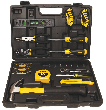Save Money by Winterizing the Home
Written by Lee Wyatt (last updated October 7, 2020)
Have you ever noticed that your utility bills skyrocket when the winter months come around? This is a rather common occurrence for many home owners. If you are faced with this situation there are things you can do to save money by winterizing the home. Using even one or two of these methods will allow you to knock off quite a bit of your bill.
- Change the filter. One of the first things that you should do when winterizing your home is by checking and changing your home's air filters. For most homes, the air filter needs to be changed every three months, or in the case of reusable air filters cleaned every three months. A dirty air filter reduces or restricts airflow, makes your HVAC unit work harder, and even run the risk of fire.
- Are your ducts sealed? A surprisingly large source of energy inefficiency in the home is the ducts themselves. While the ducts are supposed to have some openings, they are not supposed to be found along the runs themselves. Periodic check the seams along the duct runs and seal them if you find any leaks, and you will be able save a minimum of 20 percent on your heating costs.
- Programmable thermostats. By installing, and properly using, programmable thermostats you can create (and maintain) a realistic energy usage plan. With the help of a programmable thermostat you can have the heat lowered during those hours you are at work or asleep, and raised for those times when you are home or using the space. This can end up saving an average of 1 percent on your heating bills for every degree you reduce your heating for eight hours a day.
- Locate and plug leaks. Take a look at all the windows and doors in your home for any leaks. If you find any leaks, get them fixed as soon as possible. Typically speaking drafts from these kinds of leaks can lead to up to 30 percent of most utility bills. For larger drafts you may want to use simple temporary measures like a rolled up towel until you can either replace the weather stripping or even get a new door or window.
- Get an energy audit. The best way to find out where the problems in your home lie is by having an energy audit performed. These audits can cost a bit of money, but should be looked at more like an investment than an additional bill. An energy audit will allow you to identify where all of the problem areas are, and just how bad they are. This enables you to focus and plan your efforts more efficiently.
The methods listed here are only a few of the possible methods that you can use to save money on your utility bills. Keep in mind that there are literally dozens of methods that you can use to save money by winterizing the home. Regardless of the method used, perhaps the single best method available is regular maintenance. By performing regular maintenance on your home you will be aware of any possible problems, and take care of the problem when it is first identified.
Author Bio
Lee Wyatt
Contributor of numerous Tips.Net articles, Lee Wyatt is quickly becoming a regular "Jack of all trades." He is currently an independent contractor specializing in writing and editing. Contact him today for all of your writing and editing needs! Click here to contact. Learn more about Lee...
Cleaning Your Garage Floor
If you are planning on selling your home, or simply wanting to spruce up the place you might want to think about hitting ...
Discover More
Building Window Planters
Building window planters are a wonderful, and relatively inexpensive, way to add curb appeal to any home. Here is a step ...
Discover More
Window Security
When talking about window security, many people think about security or alarm systems instead of thinking about things ...
Discover More
More Home Improvement Tips
What to Look for When Hiring a Contractor
When done right, hiring a contractor can be a huge help to any home owner. However, when the wrong contractor is hired, ...
Discover More
Properly Venting a Dryer
One of the most important parts of installing an appliance like a dryer is making sure it has proper ventilation. Luckily ...
Discover More

Comments